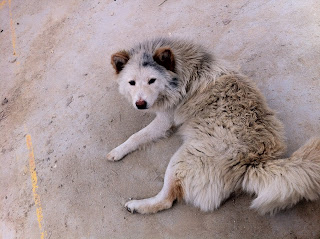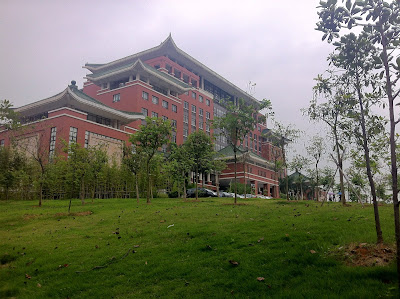Conghua House Building Trip
With HKUST Connect and Habitat for Humanity China
[See all photos here on Google+]
Visas and Donations
The visa for China cost me HKD1,100 for double entry in a 6-month period and I was not allowed to get a multiple entry visa because it was my first time and I wasn't of Chinese descent. Thus, I decided that if I was going to visit China, it would be for something meaningful. When the opportunity came to join an HKUST Connect Service Learning trip with Habitat for Humanity, I jumped on it. The only difficulty was that I had to raise HKD2,200 in donations for HFH China--this would go to hiring skilled workers, materials, and other resources for their China locations. I had a lot of help from Jackson getting sponsors to donate! Very grateful!Hence, 37 sponsors later and three days after my last final, I embarked on a 7-day trip to rural Guangdong, China.
Guangdong Province
Guangdong is a mostly Cantonese-speaking province in Southern China, and we just take a high speed express train from Hong Kong to Guangzhou. The trip is only two hours long! This was my first time traveling internationally by train. The immigration, customs, and terminals are pretty much the same, except on a smaller scale.
From Guangzhou, we had a 1.5 hour coach ride to Conghua, a place known as a hot springs tourist location (sadly, we didn't go to any hot springs), where we stayed at The Police Hotel (I seem to have forgotten the Chinese name). Here are some snapshots of the town plus an interesting flavor of oreo cookies I found at one of the markets:
View from the hotel.
Outside the hot springs resort.
"All the bodies of water in China are green..." -Patrick, Irish Exchange Student
Playing with fireworks on the first night. (It's a tourist town, c'mon!)
Orange-Lemon Oreo?
Shuiweidong Village
The next morning we left for Shuiweidong Village, which was in a remote location about forty minutes away. We were expected to do a lot of unskilled labor and we ended up doing a lot of that. We were moving bricks, moving bricks in a human chain, laying bricks for the drainage trenches, moving logs, moving bamboo, mixing cement, pushing wheelbarrows of cement, and picking berries or peanuts. We didn't get to interact extensively with the villagers nor did we get to work alongside them too much, but the few hours that we did, we felt very happy. From the few interactions and the few interviews we had with the villagers, I learned that before Habitat for Humanity came to their village, they had very little concept of what a volunteer was. But by the time our group came, many were starting to show appreciation.One of the most touching moments was when a man with polio and a disabled left hand told the HFH coordinators that he wanted to work alongside us and help us move bricks. We were told that he was very touched by the volunteers working and helping them out that it was his own decision. When Wesley introduced him, it was heartwarming and I tried to share a few words in Cantonese with him, telling him I was from America and I was happy to meet him. After sharing smiles with him, Shelly eventually told me that he can only speak and understand very little. I wasn't sure how much had gotten to him, but on our encounters in the following days, we exchanged "nei hou"s (hello's) and a smile and that was enough for me to realize that it didn't matter what we can communicate with words. Because in many instances, actions speak louder than them.

He's wearing a Laker's shirt on this day! Haha.
We spent five days on the worksite, the last of which we got to play with the village kids who come home every weekend from their boarding school (free education but the villagers pay for the dormitories and books, which are often subsidized because they are poorer). Unfortunately, I didn't take many photos from my iPhone Touch, but I found some more photos from others to illustrate the kind of work that we did.
Oh yeah, the villagers do eat their dogs sometimes, though they are mostly there to protect the village and kill the rats. When they want to eat dog, most of them don't have the heart to kill their own, so they exchange with another family...
There's a dead rat on the floor of this basketball court, fyi.
Mountains and mountains of bricks to move...
Weeding with the entire, amazing Conghua House Building team!
Drainage trench brick laying.
The hired skilled workers get to do the fun stuff (laying bricks for the walls).
And we get to deliver them the bricks using a human chain.
This is the old man who works as the tuk shop owner. He sells snacks and cold sodas for very small profit but he enjoys his life at the village, is married to a wife with polio, has four kids working in the city, and a few grandchildren.
When it was too rainy to work, we picked redberries. Delicious, they were!
The villagers cooked us lunch at every day. And I have to say, it was sometimes better than the food we ate outside.
Our Irish exchange students mixing with villagers by mixing cement!
And our Canadian exchange student scaring young village kids.
Rice fields to be harvested one month from now! A previous HFH group came and helped an 88 year old man plant this field (shown is only a small fraction of it). My first time seeing the rice fields firsthand!
Overall, amazing working trip with amazing people!
Guanzhou and its Suburbs
Crocodile in the market!!
Famous characters that kids can ride on for a yuan.
South China Agricultural University Administrative Building.
Cows at the university.
Guangzhou version of the Octopus Card and single journey coin.
Social and Political Undertones
One of the great things about going on this trip rather than going to China as a tourist, was learning firsthand about the political/social situations in China. For example, most NGO's in China are actually "GONGOs", or governmental organized NGO's, and people outside of China are normally warned about donating directly to these organizations, even reputable ones like The Red Cross. Why? Because nobody really knows how much money actually gets used for the donator's intended purpose since the money goes through the government.Our HKUST group found out that HFH China is currently losing money because they wanted to operate independently of the government and registered as a company in China rather than a GONGO. The government intervenes a lot and monitors everything, asking for paperwork, catalyzing extra costs, and slowing down the work. Land in rural China is not owned by villagers, it is owned and controlled by the government. This makes HFH's usual service-building model a lot more difficult. But this is something I see to their merit because HFH wanted to stick to the principles they set forth in their model... where (brief summary) volunteers and villagers would provide sweat equity hand-in-hand and HFH would provide micro-loans to recipients in which repaid money would be used help other families.
On our first day in the village, government officials came to inspect the site, complained that the work progress was too slow, and left HFH with the fear that even more government subsidy could be pulled from the worksite. We had learned from conversations with villagers that the government had already pulled nearly half of the available subsidy due to "slow progress." But the slow progress is not really in their control: the rainy seasons, hot and humid weather, and lack of recruits for the worksite are all been encumbering factors. I fear that many of the villagers will continue to live in their wooden temporary shelters or mudhouses for a lot longer than the contractor's original estimation of 1-year.
In spite of what we saw, most of my teammates agreed during reflections that we didn't feel like we were helping especially needy people. Some of them actually had quite a bit of money and one villager my friend spoke to even regularly visits Macau to gamble. But we were told that we weren't working in the poorest village in Guangdong. In fact, the government won't even allow HFH to go there. Which is just another frustration added to HFH's work in China. China's so focused masking all the bad stuff and establishing China's reputation as a wealthy country. I wonder if that's also a social extention of Chinese culture, which many Westerner's criticize for being all about "face" and "appearance."
Argh, I could write a really really long post about all the political and social things I learned about China but I fear that I might have issues with the government... haha, no just kidding but I'm running out of energy so I'm gonna check out. Peace!






























No comments:
Post a Comment